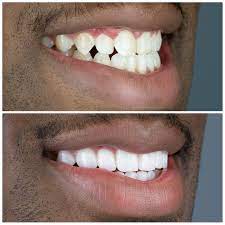If you’ve ever looked in the mirror and wished for a brighter, more symmetrical smile, you're not alone. Many people explore cosmetic dentistry options like Dental Veneers in Dubai to enhance their appearance and boost self-esteem. So, what are dental veneers and how do they work? These ultra-thin, custom-made shells are applied to the front surface of your teeth to correct flaws like discoloration, chips, gaps, and minor misalignment. Whether you're considering porcelain veneers or composite veneers, this guide will give you a comprehensive understanding of how veneers can transform your smile.
Why Dental Veneers Matter in Cosmetic Dentistry?
Dental veneers play a crucial role in smile aesthetics. They are more than just a superficial treatment—they address real issues that can affect both function and confidence. People often search online asking, “Are veneers good for teeth?” or “Can veneers improve my smile?” The answer is a resounding yes.
Here’s why veneers are a key part of many cosmetic dental treatments:
- They correct tooth discoloration that can’t be resolved with whitening
- Close gaps between teeth for a more uniform appearance
- Restore chipped or worn enamel
- Adjust slightly crooked or misshaped teeth
- Provide long-lasting results with minimal tooth alteration
Whether you’re pursuing a subtle refinement or a complete smile makeover, veneers offer a custom solution tailored to your individual facial features and smile goals. With modern advancements in materials and techniques, veneers now look and feel incredibly natural, making them a preferred choice for long-term aesthetic improvement.
Exploring the Benefits and Types of Dental Veneers:
People often ask, “What are the benefits of dental veneers?” or “Which type of veneer is best?” Understanding the advantages and types available helps in making an informed decision.
Key benefits of dental veneers include:
- Natural appearance: Designed to mimic the color and translucency of real teeth
- Durability: Especially porcelain veneers, which can last over a decade with proper care
- Stain resistance: Unlike natural teeth, veneers don’t easily stain from coffee, tea, or wine
- Minimally invasive: Less enamel is removed compared to crowns
- Instant results: Achieve a complete transformation in just 2–3 visits
Common types of dental veneers:
- Porcelain veneers: Highly durable and stain-resistant with a natural look
- Composite veneers: Quicker application, often completed in a single visit, but slightly less durable
- No-prep veneers: Require little to no enamel removal and are reversible in some cases
Choosing the right type depends on your goals, enamel condition, and long-term preferences. Porcelain veneers are popular for their longevity and realistic appearance, while composite veneers offer a faster, more affordable option for cosmetic enhancement.
Understanding the Risks and Considerations of Veneers:
Although Dental Veneers are widely praised for their aesthetic value, it’s important to understand the potential risks and limitations. Many prospective patients search “Are veneers safe for teeth?” or “Do veneers damage real teeth?” While the process is generally safe, it does involve some irreversible steps.
Risks and considerations to keep in mind:
- Enamel removal is permanent: Even in minimal-prep veneers, some tooth structure is altered
- Sensitivity: Temporary sensitivity to hot and cold is common after placement
- Chipping or cracking: Veneers can be damaged by hard foods or teeth grinding
- Not suitable for everyone: People with gum disease, weak enamel, or untreated decay may not qualify
- Color mismatch: If natural teeth stain and veneers don’t, uneven coloring can occur over time
While these risks are typically minimal, understanding them helps manage expectations and promotes better long-term care. It’s also important to maintain regular dental checkups and good oral hygiene to protect both your veneers and natural teeth.
Frequently Asked Questions About Dental Veneers:
When considering veneers, people naturally have many questions. Here are some of the most searched dental veneer FAQs to help you feel more confident about your decision:
Do veneers hurt during or after the procedure?
Most patients report little to no discomfort. Local anesthesia is typically used during enamel removal, and any post-procedure sensitivity usually fades quickly.
How long do dental veneers last?
Porcelain veneers typically last 10–15 years, while composite veneers may last 5–7 years with proper care.
Can I whiten veneers later?
No, veneers do not respond to whitening treatments, so the shade should be chosen carefully at the time of placement.
Will I still need to brush and floss with veneers?
Absolutely. Oral hygiene remains crucial to prevent decay and maintain gum health around the veneers.
Can veneers fix all cosmetic dental issues?
Veneers are ideal for minor to moderate imperfections. Severe misalignment or bite issues may require orthodontic treatment.
These queries reflect the real concerns and needs of individuals seeking cosmetic solutions for their teeth. Having accurate answers helps you plan with confidence and ensures the best outcome for your smile.
Conclusion:
In the end, deciding on dental veneers depends on your specific goals, dental condition, and commitment to oral care. Whether you’re looking to enhance a few teeth or considering a full smile transformation, veneers offer a customizable, durable, and beautiful solution to common dental imperfections.
Thanks to innovations in cosmetic dentistry, both porcelain veneers and composite veneers provide aesthetically pleasing and long-lasting results. From closing small gaps to restoring the brightness of stained teeth, veneers offer a path to a more confident you.
So if you’ve been wondering, what are dental veneers and how do they work, this complete guide should give you clarity. With proper care and the right veneer type, you can enjoy a stunning smile for years to come—proof that the right cosmetic enhancement can be both functional and transformative.






Comments